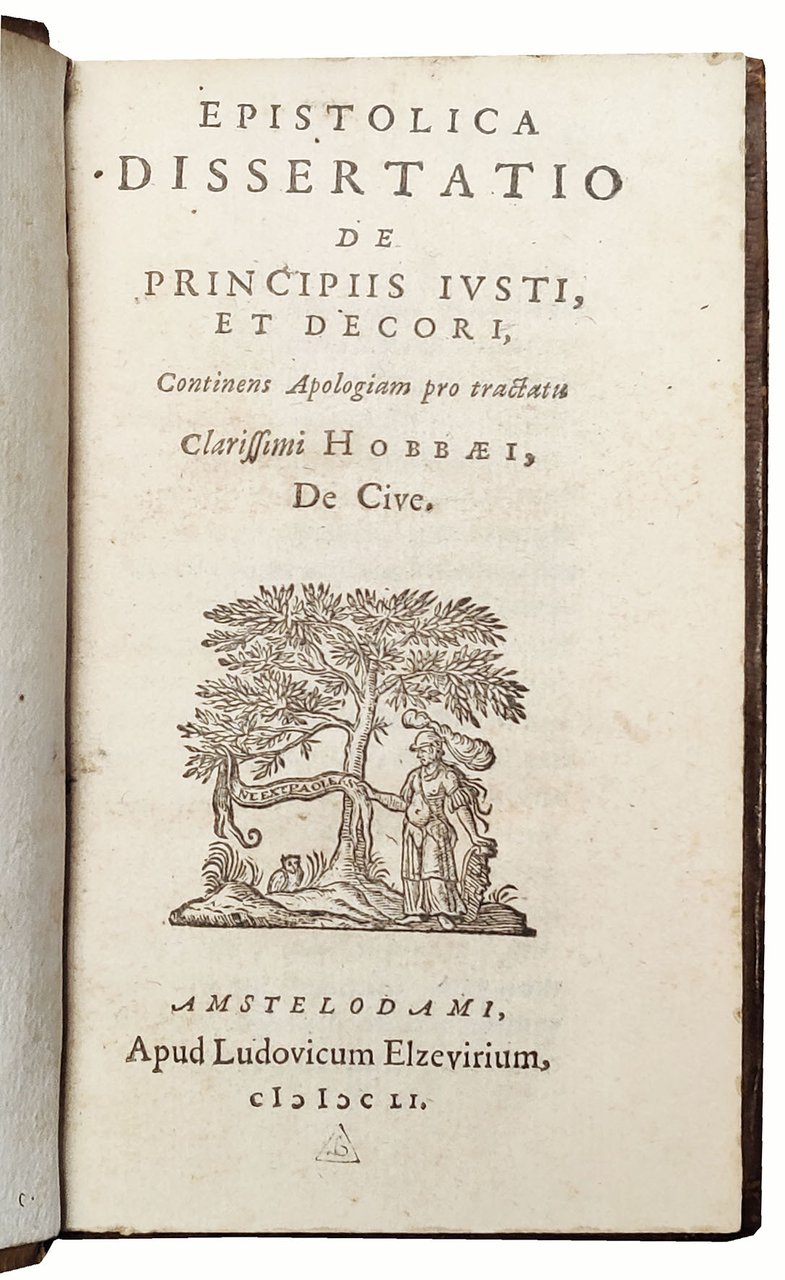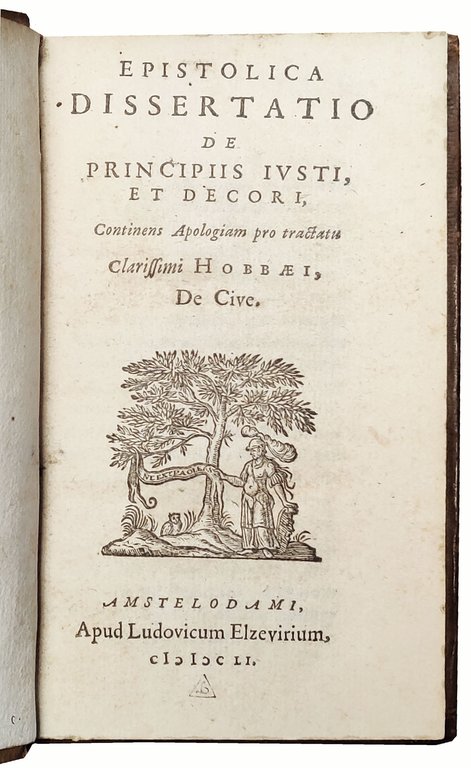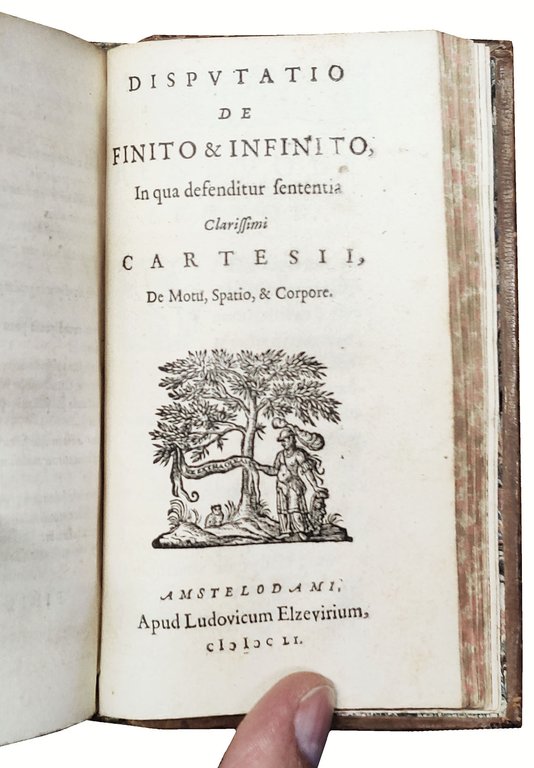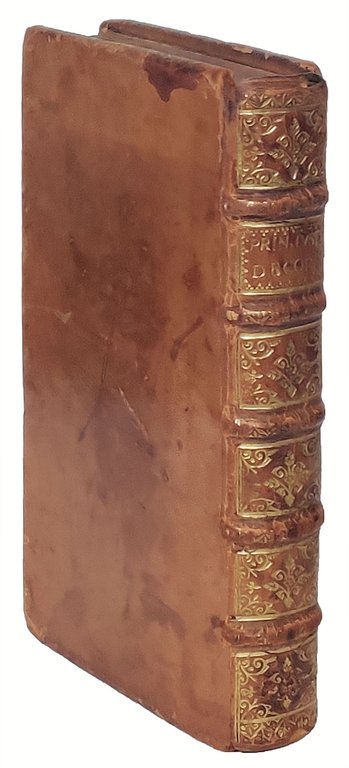Epistolica dissertatio de principiis iusti, et decori, continens apologiam pro tractatu clarissimi Hobbaei, De cive. Amsterdam, Lowijs Elzevier, 1651 [bound with:]. [EIUSDEM]. Disputatio de finito & infinito, in qua defenditur sententia clarissimi Cartesii, de motu, spatio, & corpore
Epistolica dissertatio de principiis iusti, et decori, continens apologiam pro tractatu clarissimi Hobbaei, De cive. Amsterdam, Lowijs Elzevier, 1651 [bound with:]. [EIUSDEM]. Disputatio de finito & infinito, in qua defenditur sententia clarissimi Cartesii, de motu, spatio, & corpore | Livres anciens et modernes | VELTHUYSEN, Lambert van (1622-1685)
Epistolica dissertatio de principiis iusti, et decori, continens apologiam pro tractatu clarissimi Hobbaei, De cive. Amsterdam, Lowijs Elzevier, 1651 [bound with:]. [EIUSDEM]. Disputatio de finito & infinito, in qua defenditur sententia clarissimi Cartesii, de motu, spatio, & corpore
Epistolica dissertatio de principiis iusti, et decori, continens apologiam pro tractatu clarissimi Hobbaei, De cive. Amsterdam, Lowijs Elzevier, 1651 [bound with:]. [EIUSDEM]. Disputatio de finito & infinito, in qua defenditur sententia clarissimi Cartesii, de motu, spatio, & corpore | Livres anciens et modernes | VELTHUYSEN, Lambert van (1622-1685)
Mode de Paiement
- PayPal
- Carte bancaire
- Virement bancaire
- Pubblica amministrazione
- Carta del Docente
Détails
- Année
- 1651
- Lieu d'édition
- Amsterdam
- Auteur
- VELTHUYSEN, Lambert van (1622-1685)
- Éditeurs
- Lowijs Elzevier
- Thème
- seicento
- Etat de conservation
- En bonne condition
- Langues
- Italien
- Reliure
- Couverture rigide
- Condition
- Ancien
Description
THE RECEPTION OF HOBBES AND DESCARTES IN THE NETHERLANDS IN THE MID-17TH CENTURY
Two works in one volume, 12mo (132x75 mm). [16], 269, [3] pp. Collation: *8 A-L12 M4; [8], 80 pp. Collation: *4 A-C12 D4. Printer's device on the title pages. 18th-century calf gilt, lettering piece on spine, marbled edges and flyleaves (slightly stained and rubbed, joints repaired). Tiny stamp on the first title page (an initial L inscribed in a triangle). Very light occasional foxing. A very good, genuine copy.
Rare first edition of these two works by the Dutch philosopher and theologian Lambert van Velthuysen, which were published separately but are often found together, not only because they were printed by the same printer in the same year, but also because they complement each other in bringing together the ideas of Hobbes and Descartes and helping to disseminate them in the Netherlands. Both works were included in Van Velthuysen's Opera omnia, published in 1680, but with substantially revised texts. The Epistolica dissertatio was also published in 1706 in an anonymous English translation.
“[…] philosophy penetrated more deeply into Dutch society than probably anywhere else in Europe, and the new philosophies were often developed and transformed in ways of which their authors would never have conceived. Thus, even if the two most important and influential philosophers in the Netherlands were Descartes and Hobbes, one cannot ignore the many Dutch philosophers who to a great extent created the context in which these men were read. One of the most important, and the most prolific, of these men was Lambert van Velthuysen, and the Letter [on the principles of justness and decency, containing a Defence of the Treatise De cive of the learned Mr. Hobbes] is his most original and interesting contribution. Indeed, the interest of the Letter extends far beyond the purely philosophical, the text being to a considerable extent autobiographical in nature. It tells us much about the preocupations of a member of Utrecht's ruling class, and Van Velthuysen's desire to rationalize the minutest parts of his life provides us with insights into his most private feelings, making this as valuable a text for the study of Dutch seventeenth-century culture as it is for philosophy. A central preocupation of the Letter is the justness for a Christian of inflicting punishments, a question to which Van Velthuysen repeatedly returned. His main justification for it is the maintenance of social order, another central theme of the Letter along with that of maintaining one's place within the social order and the dignity and respect that go with it, all governed by the classical notion of decorum. But he seems to have discovered a basic foundation for such arguments in the Hobbesian principle of self-preservation, and like Hobbes he uses it to reformulate classical and medieval natural law theories […] For Van Velthuysen, as for Hobbes, man was primarily driven by the instinct for self-preservation, and he formed socities not for mutual benefit but for his own well-being. From this principle, it was claimed, it was possible to derive all of natural law and thus the basis of morality. Unlike Hobbes, however, Van Velthuysen derives the entire foundation of natural law from first principles. The social order is superimposed upon a world order instituted by God that is directed towards the particular end that God had in mind when creating the universe, what is nowadays usually referred to as Intelligent Design and which was used to justify so much of the new philosophy and science of the seventeenth century. In the present case, it is the source of a natural revelation that shows us how we ought to behave, and the lesson it teaches us is that we have such a strong desire for self-preservation that it is God's will that we do everything in our power to maintain our well-being. Self-preservation is thus transformed from a basic right, which we are free to exercise, into the fundament





